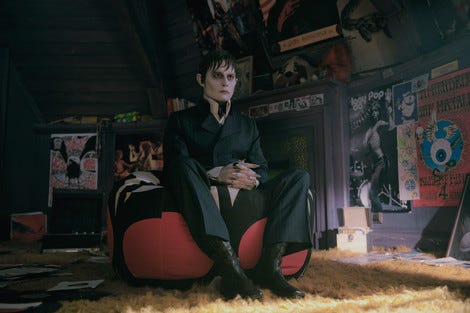The Burton Binge: "Dark Shadows"
Each Sunday with “The Burton Binge,” Sam Watermeier will look back at one of Tim Burton’s films, ultimately tracing the return to the auteur’s roots with the October 5 release of “Frankenweenie,” an animated adaptation of Burton’s first live-action short film.

Most directors repeat themselves. But few do so as visibly or tangibly as Tim Burton. One can feel his presence within the first baroque frames of the “Dark Shadows” trailer: fog-veiled ships, a starkly-angled castle, a pallid Johnny Depp — all of which add up to a Burton spectacle, like elements of a formula. Most of his recent films don’t evoke much mystery beneath their surfaces. But “Dark Shadows” is one of the few whose substance is as rich as its style.
Depp stars as the courtly Barnabas Collins, a vampire who finds himself in the fishing village of Collinsport, Maine, in 1972 after being confined to a coffin for 200 years. There, he returns to Collinwood Manor in the hopes of reviving the family fishery business — a cannery rivaled by the witch (Eva Green) who cursed him to vampirism when he rejected her advances. Amidst all the tension and intrigue, Barnabas falls for Collinwood’s governess (Bella Heathcote), a reincarnation of his former love.
With its dense, twisty plot, “Dark Shadows” captures the spirit of the soap opera upon which it is based. The film also reflects the complex nature of the show with its lush, intricate production design, which, like the film’s tonal direction, is comically offset by ’70s kitsch. (At one point, Barnabas drools over a lava lamp, which he thinks is “a pulsating blood urn.”)
Depp embodies the film’s tone, blithely juggling tragic romance and droll humor. He’s like all of Burton’s outcasts, especially Batman and Edward Scissorhands — pure of heart but dangerous when provoked. Depp initially imbues Barnabas with the same endearingly innocent fish-out-of-water nature that he brought to “Edward Scissorhands.” Only he is infinitely more eloquent, thanks to Seth Grahame-Smith’s velvety dialogue.
Among the film’s other treats are: Chloë Grace Moretz as a bratty flower child, Helena Bonham Carter as a drunken psychiatrist, Michelle Pfeiffer (in a wasted yet no less welcome appearance as the head of the Collins’ household), and a cameo by Alice Cooper.
In the end, though, the film belongs to Depp, whose performance pulsates with wit and pathos. It's one of his best performances in years -- and a great reminder of why he is Burton's muse.
While the film is far more character-driven than most of Burton’s latter efforts, it still ends up succumbing to CG wizardry, especially in the climactic battle between Barnabas and the witch Angelique — a tiresome set-piece that seems out of place in the midst of the film’s breezy, quietly comedic atmosphere.
However, the film remains one of Burton’s better efforts in the last few years. The plot is denser, the outsider themes are refreshingly subtler. Will the film have the staying power of "Edward Scissorhands" or "Ed Wood?" No, probably not. But “Dark Shadows” proves that, while he may not have many new tricks up his sleeve, Burton can still deliver a memorable piece of entertainment.
Hopefully that will remain true next week when I see “Frankenweenie,” the last film in this Burton Binge. Can you believe it’s almost over? Are you as sad as I am?


